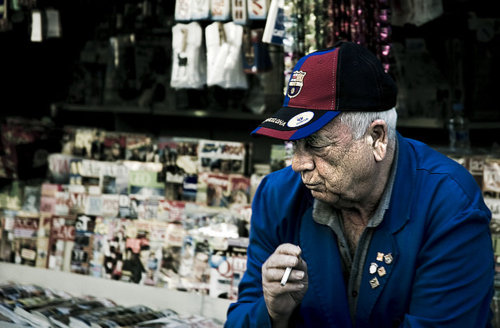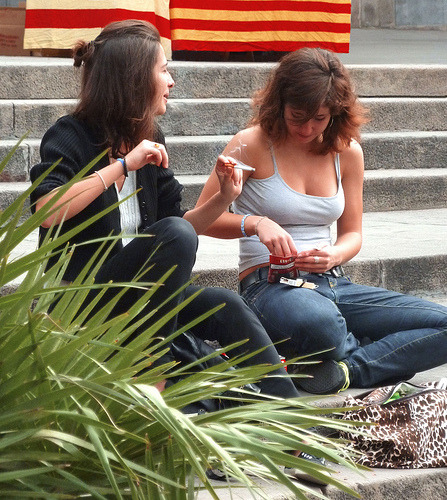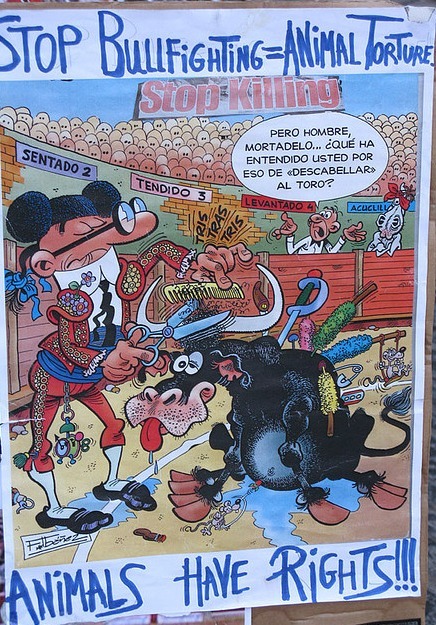Transcending culture: On FC Barcelona’s campaign against smoking
Transcending culture: On FC Barcelona’s campaign against smoking


By Eric Beard
A newspaper, a café con leche or an espresso, a café, and a cigarette. Maybe a croissant as well. It’s the stereotypical Spanish breakfast. Substitute a few tapas for the croissant and you more or less have lunch covered as well. But on the 1st of January, 2011, a newly enforced law in Spain interrupted the daily routine of millions. On this day, patrons at restaurants were no longer able to smoke inside the establishment, but were instead forced to go outside, where there was usually an added service charge.
I landed in Barcelona for my semester abroad on the 8th of January, and it became immediately clear that restaurant and café owners were desperate. The experimentation with specials changed daily, with local business owners vying for strategies on how to regain their share of the market. Needless to say, restaurants felt the residual effects of the ban immediately, losing up to 20% of customers the month it came into existence.
In Spain, mornings are meant for a trip to the café. And in a heavy recession with rampant unemployment, usually an espresso and a smoke is all the average patron can afford. The café is not only a place to eat, drink, smoke, and keep up with the news, but in Spain is the most natural way to keep up with friends and neighbors. Understandably, customers and restaurant owners were outraged. As I walked to the Metro on a sunny day, cafés would be comfortably filled with people sitting outside smoking, with hardly anyone inside. However, on a rainy day, the café would be entirely empty…
But the law carried on regardless and people managed to get on with their lives in one way or another. It wasn’t the smoothest of transitions, to say the least, but the negatively externalities began to fade. Sure, a trip to the café may not have felt as Spanish as before, but the reasoning was sound and the vast, silent majority in the city approved of the ruling. As a non-smoker, I couldn’t remain truly unbiased on the issue, but seeing a non-smoking atmosphere become the status quo throughout Spain was honestly a pleasant surprise.

This newly adopted status quo made my trips to watch FC Barcelona at the Camp Nou or Barça B at the Miniestadi oddly engrossing as I couldn’t help but assume the perspective of a sociologist. The Camp Nou is what it is, an absolutely perfected microcosm of Catalan pride and personality. The only beer that is sold in the stadium is non-alcoholic Estrella Damm, but you didn’t have to go far to find an old Catalan man smoking a cigar or a student finishing off a pack of cigarettes around the 80th minute. The smoking situation at the Camp Nou is essentially what you would expect from any estadio in Spain.
The Miniestadi, on the other hand, is a different animal. Not only is the stadium a tenth of the size of the Camp Nou, but the crowd is of a different blend. Matches at the Camp Nou often don’t end until midnight, but at the Miniestadi you’ll find yourself finished with the fútbol by early evening. The tickets are much cheaper, which makes it a viable option for almost all Barça fans. The outcome is an audience of families, a couple hundred die-hard supporters, and older men. Children come early, incessantly screaming at players to wave at them. The kids, no older than 8 or 9 years old, get their wish from most of the young Barça B players.
When the match begins, there is an order of natural, self-segregation in the stands. The packs of kids go back to watch with their families in one section, while the older men smoking are opposite to them. Occasionally the two groups cross paths if the unwritten code isn’t understand, which ends with either the family moving or one of the parents asking the smoker to put it out or move. The smoking ban in restaurants probably had nothing to do with this disposition, though this stream of consciousness was unmistakably progressive.

All of this leads us to present day. The members of FC Barcelona have voted to implement a “Smoke-free Camp Nou’ campaign to promote ”awareness of the values of health, sport and respect for children, as Barça is eminently a family club,“ according to the club’s spokeman Toni Freixa. Smoking is now illegal in all public or collectively used enclosed spaces located in sports facilities or leisure centres where food is served, and the campaign hopes to entirely ban smoking in the Camp Nou over the next few months.
Will there be backlash? Undoubtedly. But is this campaign journeying into unchartered waters? Absolutely not. Spanish and Catalan culture is evolving, leaving some of its most quintessential elements of the 20th century behind. Barcelona’s bullfighting ring has been turned into a upscale shopping mall and this past Sunday marked last day bullfighting could legally occur within the region of Catalunya. Smoking is the tip of the iceberg and it will be alluring to see where sport, culture, and social development go next.







